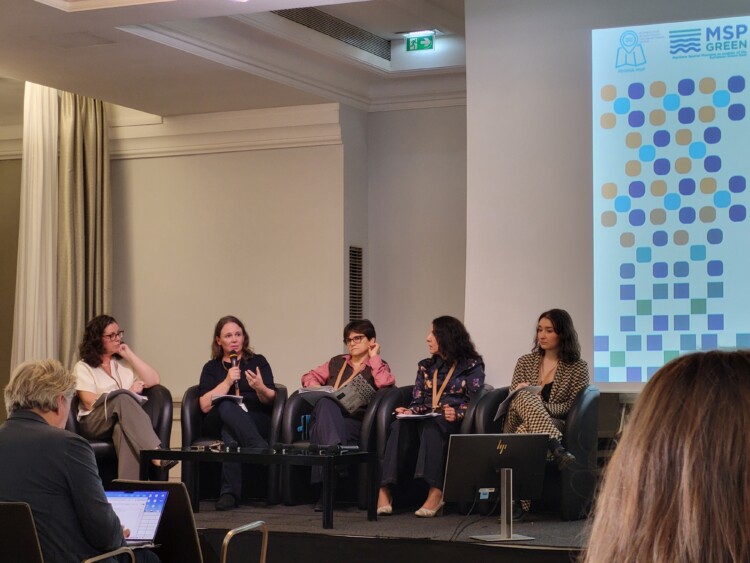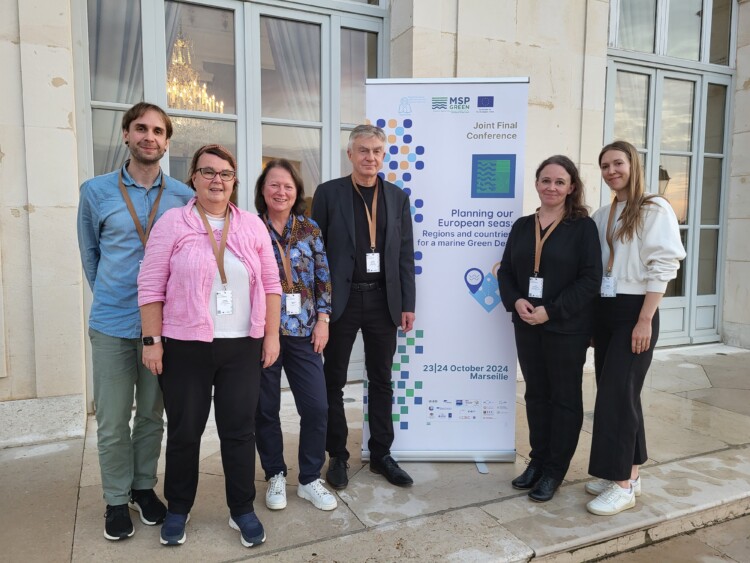Maritime Spatial Planning takes up the challenge brought on by the Green Deal
Contributing to attaining the objectives of the European Green Deal (EGD) through maritime spatial planning was at the heart of the MSP-GREEN project, which ended in October. The project analysed how the EGD themes had been addressed in the first round of Maritime Spatial Planning (MSP), identified valuable practices that support the MSP objectives and developed new measures to further the objectives. The assessment of the adaptation of commercial fisheries to climate change together with stakeholders and bringing marine multi-use into the planning table are some key contributions from the project to the second planning round.
European Maritime Spatial Planning Week was celebrated in Marseille, France from 22-24 October 2024, with the first day celebrating 10 years of maritime spatial planning, followed by a two-day final conference jointly organised by the MSP-GREEN and REGINA-MSP projects. For the last two years, the Finnish MSP Coordination has been involved in MSP-GREEN project (2022-2024), which focused on identifying ways for MSP to contribute to the European Green Deal’s targets concerning marine areas. The work carried out in the project provided valuable tools for the revision of the Finnish Maritime Spatial Plan. The final conference presented recommendations aimed specifically at planners and experts to promote the integration of the objectives of the Green Deal into MSP process.
REGINA-MSP centred on developing the role of the regions in maritime spatial planning. Unlike in Finland, many European countries’ maritime spatial plan is developed at national level. In Finland, maritime spatial planning is the responsibility of the regional councils, and thus the approach to planning differs from that of the countries involved in the project (Ireland, France, Spain, Italy and Greece). Knowledge of the characteristics of the regions and closer involvement of regional stakeholders are some advantages of planning at the regional level. The project also higlighted the concrete role of regions in taking steps towards attaining the Green Deal objectives.

During the REGINA-MSP panel discussion, Mari Pohja-Mykrä, Coordinator of the Finnish Maritime Spatial Planning cooperation (second from left) highlighted examples of maritime spatial planning work in Finland. It is an exception in Europe that the regional councils act as the responsible authority for maritime spatial planning.
A decade of maritime spatial planning in Europe
The European Union’s Marine Spatial Planning Directive entered into force in 2014 and is binding for all EU Member States. Ten years later, with only a few exceptions, Member States have existing marine spatial plans. Finland’s Marine Spatial Plan 2030 entered into force in December 2020 and is currently being updated. The updated plan is due to enter into force in 2027.
The 10th anniversary celebration of the Directive marked the journey of maritime spatial planning from its inception to the present day. Despite good achievements, there is still room for improvement. Stakeholder involvement and international cooperation were highlighted as particular areas for improvement during the event. The importance of cross-border cooperation is even greater in the face of common challenges such as climate change. In addition, the natural cover and the changing environment require marine spatial planning to continuously adapt to new needs and challenges.

Representation of Finnish MSP at the European Maritime Spatial Planning Week (from left: Vesa Arki, Maritime Spatial Planning Coordination, Maaret Stenström, Ministry of the Environment, Christine Bonn, Ostrobothnian Regional Council, Heikki Saarento, Regional Council of Southwest Finland and Mari Pohja-Mykrä and Laura Pietilä, Maritime Spatial Planning Coordination).
MSP-GREEN contributes towards a more sustainable use of marine areas
With MSP-GREEN coming to an end in October 2024, it is a good moment to reflect on the lessons learned and the next steps. ”Our role in coordinating the MSP cooperation has provided an excellent opportunity to apply the project’s lessons directly to the national MSP process. It can undoubtedly be said that the project has had a significant impact on the way the objectives of the European Green Deal are approached in the Maritime Spatial Plan revision work”, says Vesa Arki, project planner for the MSP-GREEN project. ”Through the review of Finland’s Maritime Spatial Plan 2030 and by sharing experiences across Europe, we gained an understanding of our current situation. In addition, the seven key marine-related themes of the Green Deal identified in the project have proven to be a useful framework through which to approach the topic in MSP,” Arki continues.
The seven themes identified by the project are climate change mitigation, climate change adaptation, biodiversity conservation and restoration, sustainable marine food production, zero pollution, blue circular economy and fair and just green transition. Some of the themes are directly linked to maritime spatial planning, while others can be influenced more indirectly.
The project recommendations and a summary of the main recommendations for the Baltic Sea Region will be published on the project website around the turn of the year. ”It is important that the good work done by the project is continued in the second round of maritime spatial planning, where the European Green Deal is one of the cross-cutting themes. This theme was also chosen as the theme for the first national MSP Days in November”, said Arki.
The main results of the MSP-GREEN project from the perspective of Finnish maritime spatial planning and the news published as part of the project can be found on the EU projects page. You can find out more about the project’s outputs at www.mspgreen.eu.
REGINA-MSP (2022-2024) is a sister project to MSP-GREEN, which aims to strengthen the involvement of local and regional actors in the development and implementation of marine spatial planning at national level.
MSP-GREEN is funded by the European Maritime, Fisheries and Aquaculture Fund. The project ran from November 2022 to October 2024.
Twitter: @MSPGREEN22 & LinkedIn: MSP – GREEN





